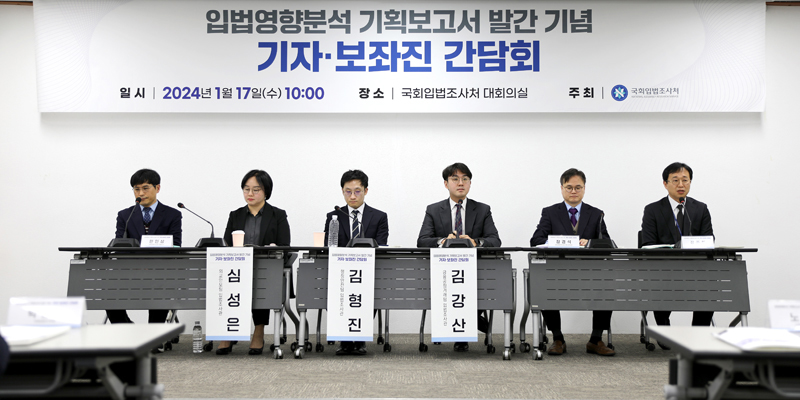
Legislative Impact Analysis (LIA) aims to preemptively predict and analyze in objective and scientific ways the comprehensive impact of a bill once it is enacted. LIA enables legislators to compare and analyze various elements when drawing up bills. This new system will eventually enable lawmakers to enact better laws.
The National Assembly Research Service has accumulated knowledge and know-how on LIA over the last decade and initiated a pilot project of releasing LIA reports in 2023. The project focuses on suggesting feasible models such as criteria, process, and methodology of cost-benefit analysis on bills.
In addition, our recent conference aimed to introduce three LIA project reports, which will set standards and the significance of LIA reports to the press and aid staff while outlining future plans and vision of LIA-related works.
During the conference, Chief Park Sang Chul addressed the attendees, stating, “I would like to take this opportunity to prove to you that enacting LIA can improve the quality of legislation while supporting legislators by introducing the hard copy of the project report in person.” He also emphasized that “the significance of LIA reports lies in meeting the public’s expectation and strengthening legislators’ right to legislate.”
The three projects’ reports were conducted on: 1) Partial Amendments on Housing Act (regarding noise between floors), 2) Partial Amendments on Medical Service Act (regarding medical data transaction by a third party), and 3) Partial Amendments on Military Service Act (regarding dissemination of information about ways for draft evasion via information network system).
During the Q&A session following the presentation of the reports, the press and aid staff showed high interest in and strong support for LIA. The 21st National Assembly has undergone six amendments on LIA of the National Assembly Act. There is a growing consensus that LIA is necessary and should be rapidly adopted when bills are proposed by National Assembly members. The Steering Committee of the National Assembly and the press also show amicability toward the situation by expressing high interest in the institutionalization of LIA.
The National Assembly Research Service will continue to strive to establish manuals and systems to adopt LIA as an ongoing task while adjusting roles and reshuffling the organization so that legislative research and LIA can become two pillars of NARS.
The National Assembly Research Service has accumulated knowledge and know-how on LIA over the last decade and initiated a pilot project of releasing LIA reports in 2023. The project focuses on suggesting feasible models such as criteria, process, and methodology of cost-benefit analysis on bills.
In addition, our recent conference aimed to introduce three LIA project reports, which will set standards and the significance of LIA reports to the press and aid staff while outlining future plans and vision of LIA-related works.
During the conference, Chief Park Sang Chul addressed the attendees, stating, “I would like to take this opportunity to prove to you that enacting LIA can improve the quality of legislation while supporting legislators by introducing the hard copy of the project report in person.” He also emphasized that “the significance of LIA reports lies in meeting the public’s expectation and strengthening legislators’ right to legislate.”
The three projects’ reports were conducted on: 1) Partial Amendments on Housing Act (regarding noise between floors), 2) Partial Amendments on Medical Service Act (regarding medical data transaction by a third party), and 3) Partial Amendments on Military Service Act (regarding dissemination of information about ways for draft evasion via information network system).
During the Q&A session following the presentation of the reports, the press and aid staff showed high interest in and strong support for LIA. The 21st National Assembly has undergone six amendments on LIA of the National Assembly Act. There is a growing consensus that LIA is necessary and should be rapidly adopted when bills are proposed by National Assembly members. The Steering Committee of the National Assembly and the press also show amicability toward the situation by expressing high interest in the institutionalization of LIA.
The National Assembly Research Service will continue to strive to establish manuals and systems to adopt LIA as an ongoing task while adjusting roles and reshuffling the organization so that legislative research and LIA can become two pillars of NARS.

